Elijah McClain’s mom flees manslaughter trial in distress as jurors are shown clip of him dying after being restrained by cops and paramedics while walking home
Elijah McClain’s mother burst into tears and fled a Colorado courtroom Friday after seeing videos of her son dying on the ground.
McClain, a 23-year-old Black man, went into cardiac arrest on August 24, 2019, and died in a hospital six days later.
The fatal confrontation with Aurora police gained renewed public attention in 2020 following the death of George Floyd and the resulting Black Lives Matter riots.
Under mounting public pressure, a state grand jury has indicted five first responders on charges of felony manslaughter and negligent homicide, among lesser crimes.
Sheneen McClain, McClain’s mother, sat in the front row of the courtroom for the case against two police officers — Randy Roedema and Jason Rosenblatt — as her son’s video clips were shown for about an hour. They have pleaded not guilty.
“Knowing everything Elijah went through keeps me here every day,” she said.
Sheneen McClain (pictured), the mother of Elijah McClain, broke down in tears and fled a Colorado courtroom on Friday after seeing videos of her son pinned to the ground

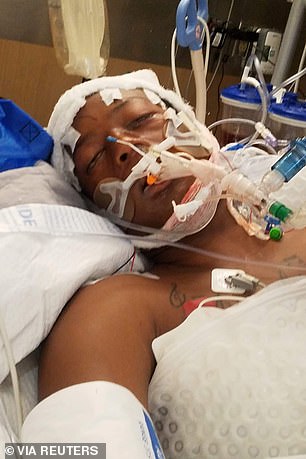
Elijah McClain left and ended up in the hospital after being fatally injured during his arrest in Aurora, Colorado, in August 2019. He died from his injuries six days later
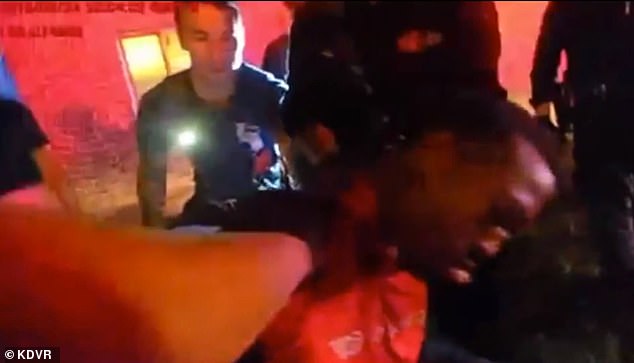
McClain was walking home from a grocery store with a bottle of iced tea when he was stopped by police officers responding to a call about a suspicious man wearing a mask
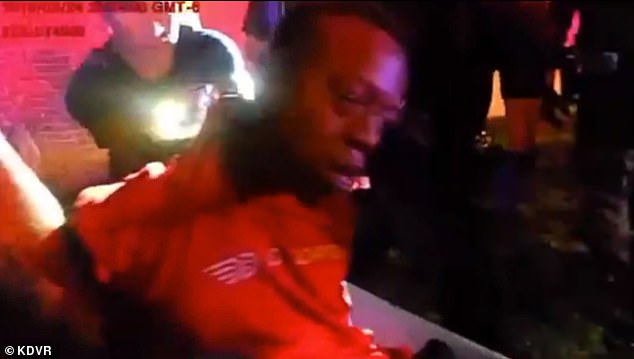
Police put McClain in a chokehold and medical responders later sedated him with ketamine
McClain was walking down the street in the Denver suburb of Aurora on August 24, 2019, when he was approached by police.
Authorities were alerted to him after a 911 call reported a man in the area who appeared “sketchy” because he was wearing a balaclava on a warm night.
McClain’s family previously said he wore the mask because of his anemia, which made it easier for him to feel the cold.
In bodycam footage of the incident, McClain can be heard saying, “I plan to take my power back.”
One of the officers said to the radio: ‘Give us more units. We’re fighting him.’
Shortly afterwards, McClain cried and groaned and apologized.
‘I wasn’t trying to. I can’t breathe properly,” he was heard saying as an officer told him not to move.
Then he threw up and an officer ordered him to break away from him.
McClain lost consciousness after an officer held his neck and pressed against his carotid artery.
After 15 minutes on the ground, he was given 500 milligrams of ketamine.
He died in hospital six days later.
An autopsy report concluded that McClain died of “complications of ketamine administration after forcible restraint.”
He overdosed because he was given a higher dose of ketamine than recommended for someone his size, pathologist Stephen Cina found.
Colorado prosecutors showed police body camera footage as they began building their case in court Friday. The video has been digitally enhanced, making the images clearer and removing distracting noise.
The mother left the courtroom in tears when the images faltered. She was escorted to an office down the hall and returned after an hour to review the testimony.
She planned to attend the trial every day to make sure people recognized her son as a real person, Sheneen McClain told police. Associated press outside the court.


Rosenblatt, left, and Roedema, right, have pleaded not guilty to charges of negligent homicide, manslaughter and assault, all felonies
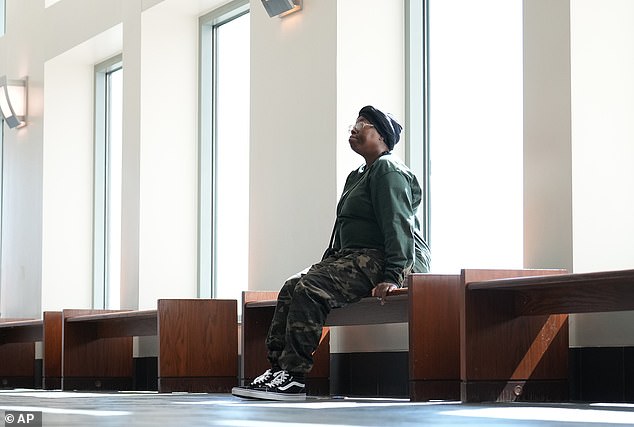
She cried as she was escorted to an office down the hall and returned after an hour to watch the testimony
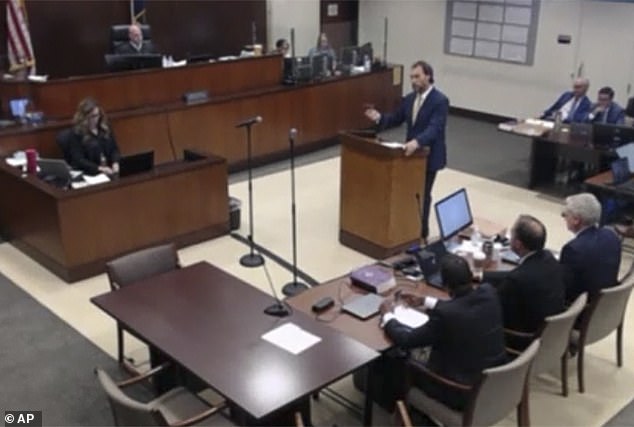
Prosecutors enhanced the bodycam footage as they began building their case
Dr. David Beuther, an intensive care pulmonologist, testified Friday.
He said he believes McClain inhaled his vomit into his lungs, making it difficult for him to breathe, and that he was unable to expel it while he lay on his side and was restrained by police.
Beuther told the court that McClain’s health continued to deteriorate to the point where he was in a hospital intensive care unit in the seconds before ketamine was injected into his arm.
The two officers on trial Friday, Roedema and Rosenblatt, have pleaded not guilty to charges of negligent homicide, manslaughter and assault, all felonies.
Police officers Nathan Woodyard, Roedema, Rosenblatt and paramedics Jeremy Cooper and Lieutenant Peter Cichuniec were indicted on 32 charges, including murder and negligent manslaughter.
McClain’s mother settled her federal civil rights lawsuit against the city of Aurora, Colorado for $15 million over her son’s death in August 2019, marking one of the largest payouts by any city in the country.
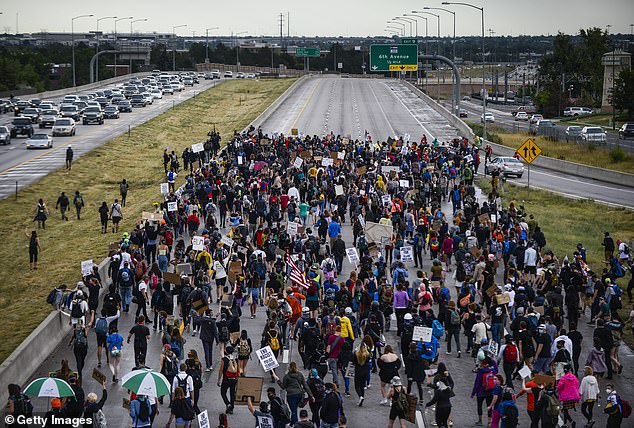
Further interest in McClain’s death arose after 44-year-old black man George Floyd died at the hands of officers in 2020. Both men uttered the words “I can’t breathe.” Pictured: A protest for McClain in Aurora on July 25, 2020
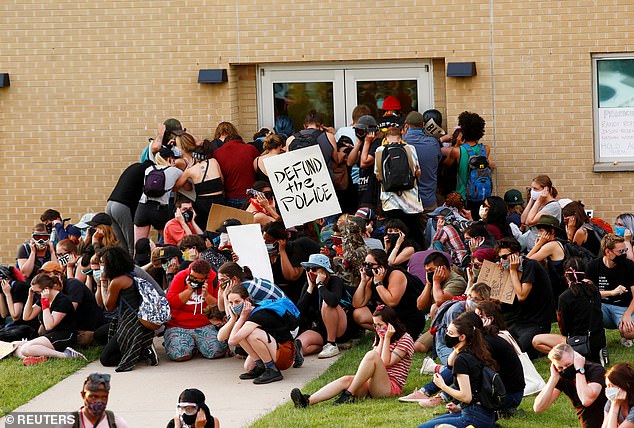
Protesters, pictured in July 2020, block an exit to the police station of the officers who arrested McClain
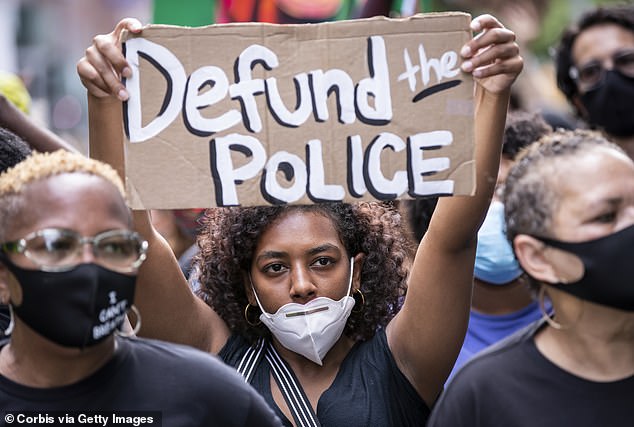
The deaths and the Black Lives Matter riots led to widespread demonization of police forces in the US, resulting in an effort to ‘defund the police’
Jeremy Cooper and Lt. Peter Cichuniec, both of whom injected the ketamine, will appear in separate proceedings.
Police Officer Nathan Woodyard, who was first on the scene and allegedly the one who placed McClain in a chokehold, will appear alone in a third trial.
McClain’s death led to mass demonstrations and renewed research surrounding the use of ketamine by first responders.
Along with George Floyd, Breonna Taylor and Michael Ramos, McClain has become one of the household names synonymous with what has been called “extreme police brutality.”
The dead and the Black lives matter riot led to widespread demonization of police forces in the US, resulting in an effort to “defund the police.”
